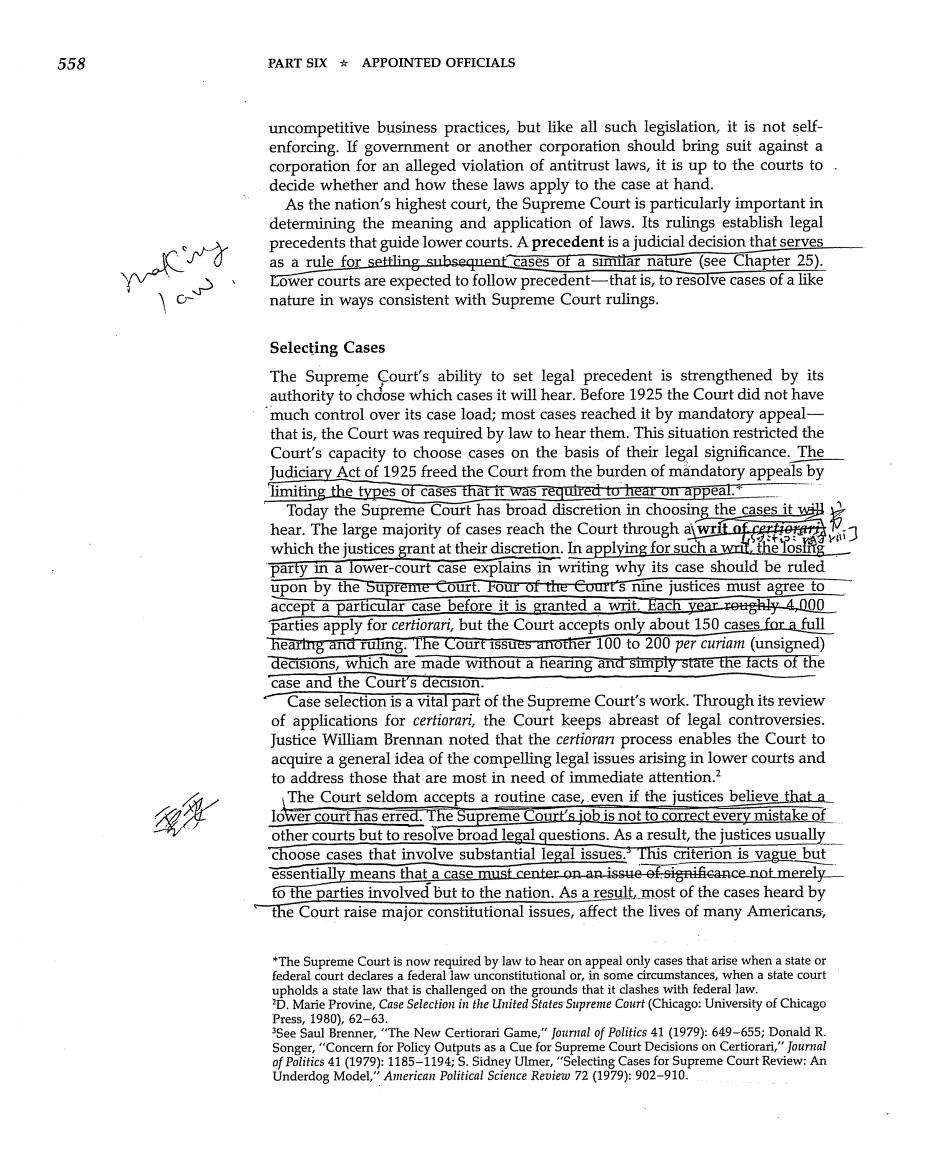正在加载图片...

558 PART SIX APPOINTED OFFICIALS uncompetitive business practices,but like all such legislation,it is not self- enforcing.If government or another corporation should bring suit against a corporation for an alleged violation of antitrust laws,it is up to the courts to decide whether and how these laws apply to the case at hand. As the nation's highest court,the Supreme Court is particularly important in determining the meaning and application of laws.Its rulings establish legal 才 precedents that guide lower courts.A precedent is a judicial decision that serves as a rule for settling subsequent cases of a similar nature (see Chapter 25). Cw Lower courts are expected to follow precedent-that is,to resolve cases of a like nature in ways consistent with Supreme Court rulings Selecting Cases The Supreme Court's ability to set legal precedent is strengthened by its authority to chdose which cases it will hear.Before 1925 the Court did not have much control over its case load;most cases reached it by mandatory appeal- that is,the Court was required by law to hear them.This situation restricted the Court's capacity to choose cases on the basis of their legal significance.The Judiciary Act of 1925 freed the Court from the burden of mandatory appeals by limiting the types of cases that it was required to hear on appeal. Today the Supreme Court has broad discretion in choosing the cases it will hear.The large majority of cases reach the Court through a writ of certerr 4 which the justices grant at their discretion.In applying for such a writ the losiig party in a lower-court case explains in writing why its case should be ruled upon by the Supreme Court.Four of the Court's nine justices must agree to accept a particular case before it is granted a writ.Each year roughly 4,000 parties apply for certiorari,but the Court accepts only about 150 cases for a full hearing and ruling.The Court issues another 100 to 200 per curiam(unsigned) decisions,which are made without a hearing and simply state the facts of the case and the Court's decision. Case selection is a vital part of the Supreme Court's work.Through its review of applications for certiorari,the Court keeps abreast of legal controversies. Justice William Brennan noted that the certiorant process enables the Court to acquire a general idea of the compelling legal issues arising in lower courts and to address those that are most in need of immediate attention.? The Court seldom accepts a routine case,even if the justices believe that a_ 州 lower court has erred.The Supreme Court's job is not to correct every mistake of other courts but to resolve broad legal questions.As a result,the justices usually choose cases that involve substantial legal issues.This criterion is vague but essentially means that a case must center on an issue of significance not merely fo the parties involved but to the nation.As a result,most of the cases heard by the Court raise major constitutional issues,affect the lives of many Americans, *The Supreme Court is now required by law to hear on appeal only cases that arise when a state or federal court declares a federal law unconstitutional or,in some circumstances,when a state court upholds a state law that is challenged on the grounds that it clashes with federal law. D.Marie Provine,Case Selection in the United States Supreme Court(Chicago:University of Chicago Press,1980),62-63. 3See Saul Brenner,"The New Certiorari Game,"Journal of Politics 41(1979):649-655;Donald R. Songer,"Concern for Policy Outputs as a Cue for Supreme Court Decisions on Certiorari,"Journal of Politics 41 (1979):1185-1194:S.Sidney Ulmer,"Selecting Cases for Supreme Court Review:An Underdog Model,"American Political Science Review 72(1979):902-910